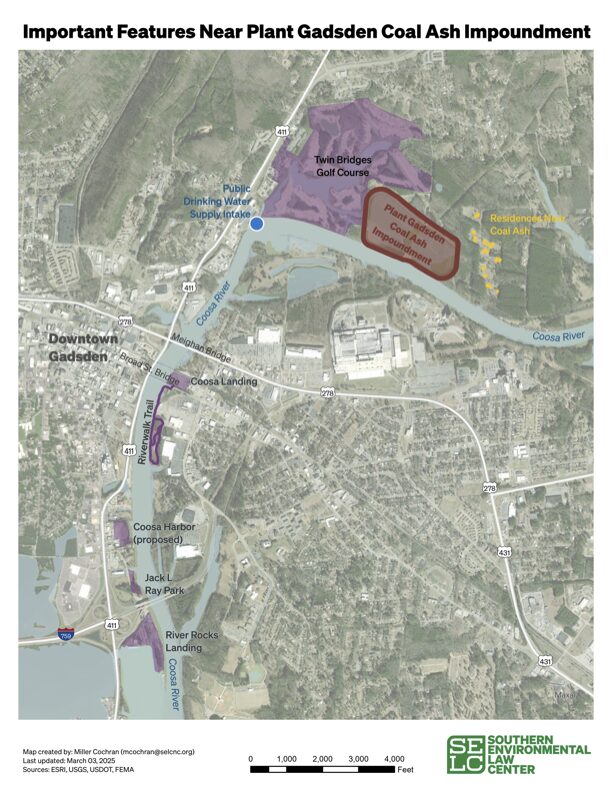From the Southern Environmental Law Center:

COOSA RIVERKEEPER FILES A NOTICE OF INTENT TO SUE ALABAMA POWER UNLESS IT STOPS ONGOING POLLUTION OF COAL ASH INTO GROUNDWATER AT THE FORMER SITE OF THE GADSDEN STEAM PLANT
GADSDEN, Ala. — On behalf of Coosa Riverkeeper, the Southern Environmental Law Center (SELC) put Alabama Power Company on notice that the Riverkeeper intends to sue the utility to stop ongoing groundwater pollution from Alabama Power’s failed closure of its leaking toxic coal ash lagoon at the former Gadsden Steam Plant. This ongoing pollution has continued for years after the lagoon was capped, in violation of the Resource Conservation and Recovery Act (RCRA) and the Coal Combustion Residuals (CCR) Rule, which regulate coal ash disposal.
Coal ash is the byproduct of burning coal for energy generation. Alabama Power chose to store nearly 1.5 million tons of toxic coal ash created at Plant Gadsden in an unlined pit, in the floodplain, on the banks of Neely Henry Lake and the Coosa River. Alabama Power “capped” the pond in an unlined leaking pit, but the company’s own reports show the ash underneath remains in contact with groundwater—in fact, nearly 40% of the ash remains saturated in water. As recently as October 2024, Alabama Power reported levels of arsenic forty times the legal standard in groundwater. This shows that Alabama Power’s preferred method of burying its toxic coal ash does not protect important groundwater resources. Alabama Power also relies on a faulty groundwater monitoring system that does not adequately measure how the coal ash is contaminating groundwater. These are clear violations of national coal ash disposal standards.
The notice was sent to Alabama Power, the Environmental Protection Agency, and Alabama state officials. Alabama Power has 60 days to correct its violations of coal ash storage standards. If the company does not eliminate those violations, SELC may file suit on behalf of Coosa Riverkeeper in U.S. District Court to require compliance with the rule.
“The stacks at Plant Gadsden may be gone, but Alabama Power’s legacy of pollution remains,” said Justinn Overton, Executive Director and Riverkeeper at Coosa Riverkeeper. “Alabama Power cannot knowingly leave a leaking coal ash pond in place upstream from Gadsden’s drinking water intake and booming ecotourism developments and call themselves good neighbors. Coosa Riverkeeper has been saying this has been a problem for years, even before the pond was closed. It’s time for Alabama Power to do the right thing and move their ash.”
This is not just a threat to health and the environment, but to the local economy. The coal ash pond is less than a mile upstream from a drinking water intake for the Gadsden Water Works and Sewer Board that provides drinking water to over 14,000 customers. Neely Henry Lake’s estimated economic impact for the region was up to $570 million in 2017. Catastrophic coal ash spills in Kingston, Tennessee and on the Dan River in North Carolina and Virginia show that health, environmental, and economic impacts of an unthinkable coal ash tragedy take decades to recover from.
“Alabama Power has zero excuses for leaving its leaking waste dump in the middle of the commercial riverfront area of Gadsden and exposing the community to this hazard,” said Barry Brock, director of SELC’s Alabama office. “Other utilities across the South are cleaning up unlined coal ash dumps and moving waste to safer storage away from our waterways. Alabama Power must do the same in Gadsden.”
Coal ash contains dangerous heavy metals like lead, mercury, cadmium and arsenic, which are known to cause cancer and other serious illnesses, according to the EPA.
Utilities across the Southeast have moved more than a quarter of a billion tons of toxic coal ash to safe, dry, lined landfills, or they are recycling ash into cement and concrete. Every unlined pond in North and South Carolina has been excavated or is being excavated, including Duke Energy who is excavating more than 145 million tons. In Virginia, Dominion Energy is excavating all its unlined coal ash impoundments, and Appalachian Power is excavating its sole open coal ash impoundment. The Tennessee Valley Authority is excavating 12 million tons of coal ash. Alabama Power’s sister company, Georgia Power, is excavating half of the coal ash it has stored in unlined ponds, and in May 2024 submitted plans to excavate another 16 million tons.

You can read the Full NOIS Here:
https://acrobat.adobe.com/id/urn:aaid:sc:VA6C2:3f496a4c-d357-404f-977f-7cc07ae828d2




